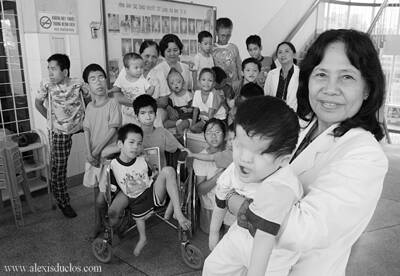A group of 10 interreligious figures who visited Vietnam in late spring said the toxic, corrosive effects of Agent Orange still jeopardize the Vietnamese people 35 years after the war's end. Traveling as the Agent Orange in Vietnam Information Initiative, the group said money is still needed to clean up "hot spots" in Vietnam where dioxin, the key ingredient in Agent Orange, persists in concentrations hundreds of times what is thought to be the safe maximum.
In Da Nang, site of a U.S. airbase during the war, "the stench [from Agent Orange] was burning to our nostrils," said the Rev. Carroll Baltimore, president of the Progressive National Baptist Convention. "We had to purchase throwaway shoes to protect us from being contaminated," he added, calling the situation "overwhelming."
Loretto Sister Maureen Fiedler, during an Aug. 26 conference call with reporters, recalled having seen dozens of children whose disabilities were thought to be caused by Agent Orange, as dioxin is believed to affect the genes of those who have ingested it. "Dozens and dozens of them [children with disabilities]. They were severely disabled. While no one can specifically connect Agent Orange with a specific disability, there is a correlation," said Sister Fiedler, host of the syndicated "Interfaith Voices" radio show.
Agent Orange was used by U.S. forces in Vietnam between 1965 and 1970. A chemical defoliant, it was sprayed from planes to eliminate ground cover for North Vietnamese soldiers and to reduce reliance on subsistence crops. Of the 20 million gallons of defoliants sprayed by the United States, about 60 percent, or 12 million gallons, was Agent Orange.
According to Vietnam's Red Cross, as many as 3 million Vietnamese have been affected by Agent Orange, including at least 150,000 children born with birth defects. U.S. Vietnam War veterans have also tried to tie their own illnesses and their children's birth defects to exposure to Agent Orange, although the federal government's Department of Veterans Affairs has been slow to approve claims unless the veteran can prove the condition began while in the service or within a year of discharge.
"The people are suffering, the land is rupturing," said Rabbi Steve Gutow, president and CEO of the Jewish Council for Public Affairs. "It was sad to know that the Ford Foundation had given more money to Vietnam than we have given" as a nation for cleanup efforts, he added.
That is about to change. On top of a $3 million appropriation in the State Department budget approved earlier this year, another $12 million was OK'd through a supplemental appropriation earlier this summer, according to Phil Sparks, an official with the initiative. The new funding will accelerate the pace of hot spot cleanup at the Da Nang airport, increase the aid to help the Vietnamese government deal with the situation, and fund U.S. nongovernmental organizations already in Vietnam working with the country's disabled population.
The Initiative's group was led by the Rev. Robert Edgar, a Methodist minister who is now head of the nonpartisan government watchdog group Common Cause. Also on the trip was Loretto Sister Paulette Peterson, a clinical psychologist for the Veterans Administration, and Richard Cizik, president of the New Evangelical Partnership for the Common Good.
Sister Fiedler praised the work of a Vietnamese Catholic priest, Father Phan Khac Tu, who established the first center for children with disabilities in Vietnam. Father Tu "is really a hero in Vietnam for his work with children with disabilities," she said. "He's got one center and he's trying to build a bigger one."
The Loretto Sister added that she would "like to hear some preaching on the subject on the destruction of war and its spreading effects, more than when the media just covers a conflict—and calling on us to do some reparations, frankly. In the Catholic tradition, you confess a sin, but you're supposed to have a clear intention of amendment—something to make it right if you've caused ill."








